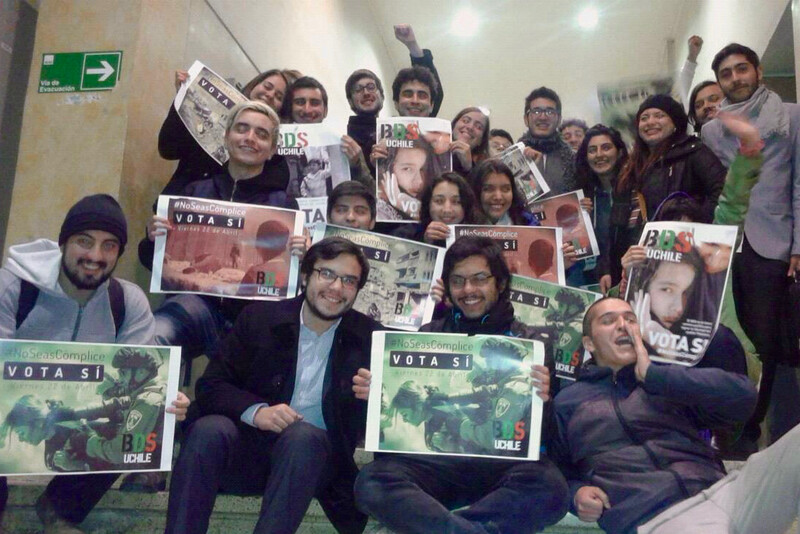Activism and BDS Beat 3 May 2016

Students at the University of Chile law school celebrate referendum vote to back Israel boycott. (via Facebook)
Students at the law school of the University of Chile have voted by a landslide to back the Palestinian call for the boycott of Israeli academic institutions.
With about a thousand students casting ballots last week, 56 percent agreed that “there should be no activities in the law school that involve the participation of persons who are functionaries of the State of Israel and/or are funded by the Israeli embassy.”
Sixty-four percent approved a second ballot measure stating that the University of Chile should not maintain any “institutional connections with those Israeli universities that contribute directly to the violation of the human rights of the Palestinian people.”
Vigorous debate
Abraham Saba, vice-president of the General Union of Palestinian Students of Chile (UGEP Chile) and an active member of the campaign coalition BDS UChile, told The Electronic Intifada that the referendum capped a successful Israeli Apartheid Week on campus, featuring speakers from Palestine, South Africa and Brazil.
Saba added that the law school had seen a vigorous debate in the last year, spurred by objections to the law school administration’s speaking invitation to the Israeli ambassador last October.
“Many students strongly questioned the way the dean approached the relationship with the Israeli embassy, pointing out that it is inadmissible that a school like this maintain relations with an oppressor state and human rights violator outside the frame of international law,” Saba said.
Saba noted that the law school, and the University of Chile in general, have historically been “in the forefront of political struggles and social movements, especially for human rights and social justice.”
The Simon Wiesenthal Center, a Los Angeles-based anti-Palestinian campaign group, likened the referendum to the Spanish Inquisition, and urged University of Chile Rector Ennio Vivaldi Véjar to “nullify” it.
Shimon Samuels, a spokesperson for the Simon Wiesenthal Center, praised repressive measures backed by pro-Israel groups in other countries that aim to conflate opposition to Israel’s well-documented human rights abuses, on the one hand, with anti-Jewish bigotry, on the other.
“Canada, Great Britain, the United States and the City of Paris have each passed legislation against BDS viewing it as a contributory factor to anti-Semitism and incitement to violence against Jews in their jurisdiction,” Samuels said.
The International Jewish Anti-Zionist Network, including its branch in Argentina, Judíos Antisionistas Argentina, dismissed the Wiesenthal Center’s claims as “defamation” against the Chilean students backing the boycott.
Accusations of anti-Semitism, often unfounded, have become a standard method for Israel and its surrogates to seek to discredit, silence and marginalize supporters of Palestinian rights.
But these and other tactics have failed to stem growing global support for BDS – the Palestinian-led boycott, divestment and sanctions movement.
Sanctioning actions not opinions
In a statement sent to The Electronic Intifada, BDS UChile rebuffs accusations that the boycott is aimed at silencing opinions or stifling academic freedom.
“BDS seeks to sanction actions, not opinions,” the group says. “No hunt will take place, but the empowerment of the students, staff and academics to avoid being accomplices with the institutions that de facto – and not only by speech – violate human rights.”
Human rights defenders have long pointed out that Israeli universities provide direct support to Israel’s military occupation and other abuses against Palestinians through land confiscation, weapons research and subsidizing and glorifying participants in Israel’s military attacks on Gaza.
“This is just the start,” BDS UChile says; the group is now advocating for similar decisions in other departments and at institutions around the country.
PSCABI, the Palestinian Students’ Campaign for the Cultural and Academic Boycott of Israel, said it was “delighted” at the vote, drawing parallels with the struggle against apartheid in South Africa.
“Only [with] the support of conscientious people, including students in Latin America, did the apartheid system crumble,” PSCABI said.
AAA vote
Currently, members of the American Anthropological Association (AAA) are also voting in a referendum on whether to follow other major US academic organizations in backing the boycott.
To urge support for the measure, Anthropologists for Justice in Palestine published this six-minute video featuring scholars at Birzeit University, in the occupied West Bank, speaking about why the boycott is necessary.
Students and faculty talk about their struggle for education under military occupation, hampered by Israel’s frequent arrests of students, raids on campus and its effective ban on students from Gaza attending the university.During the first intifada, Israel shut down Birzeit University altogether for four years.
“We urge you to vote to support boycott as an expression of your humanity, as a way to stand up for human rights, says Ibrahim al-Talla, one of the very few students from Gaza currently in the West Bank.




